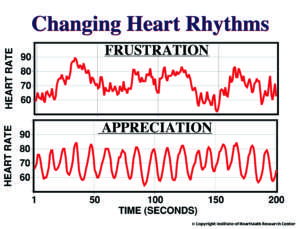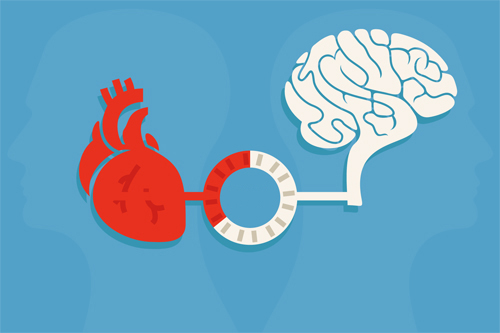 Our understanding of how heart function affects mental and emotional well-being has been advanced by leaps and bounds thanks to the Institute of HeartMath (IHM). Studies conducted by this pathbreaking research organization show that signals sent from the heart to the brain via the nervous system dramatically affect how we think and feel. As the IHM notes, “These heart signals have a significant effect on brain function—influencing emotional processing as well as higher cognitive faculties such as attention, perception, memory, and problem-solving.”
Our understanding of how heart function affects mental and emotional well-being has been advanced by leaps and bounds thanks to the Institute of HeartMath (IHM). Studies conducted by this pathbreaking research organization show that signals sent from the heart to the brain via the nervous system dramatically affect how we think and feel. As the IHM notes, “These heart signals have a significant effect on brain function—influencing emotional processing as well as higher cognitive faculties such as attention, perception, memory, and problem-solving.”
We are often unaware of shifts in our heart rate pattern that alter these signals. And monitoring pulse and blood pressure doesn’t reveal the subtle changes in this pattern from one beat to another. According to the IHM, “The rhythm of a healthy heart—even under resting conditions—is actually surprisingly irregular, with the time interval between consecutive heartbeats constantly changing.”
But heart rate variability (known as HRV) is important, because it measures our ability to adapt to changes in our environment in a healthy way. The chaotic, “incoherent” HRV that occurs during a stressful situation compromises brain function. A more predictable, smooth pattern—known as “coherence”—helps enhance our ability to think clearly and remain emotionally stable.
During a state of high coherence, the functioning of your heart, brain, and autonomic nervous system are synchronized. This state differs from relaxation, which usually involves a lowering of the pulse rate. Coherence is not dependent on the number of heartbeats but rather on having an HRV that is smooth and consistent—in what the IHM refers to as “a simultaneous state of relaxation, readiness, and revitalization.”
When coherence increases, there is more synchronization between the parasympathetic and sympathetic parts of the nervous system. The parasympathetic system helps keep the body stable; it maintains normal functions and preserves body resources by aiding with digestion, controlling the bladder, and slowing down heart rate, among other things. The sympathetic system is like the body’s EMT; it helps the body react quickly to situations requiring fast action, such as threats of danger, by increasing heart rate, respiration, and perspiration.
During coherence, there tends to be a shift toward greater activity in the parasympathetic system. A number of other systems in the body also become more synchronized to the heart rhythm. The more you can stay in the coherence zone, the better your health and emotional well-being will tend to be. A more coherent HRV over time may even slow the aging process.

While increasing HRV coherence is clearly beneficial to our health, making it happen can be difficult. But the IHM has made it a lot easier with technology that takes just 5 to 10 minutes a day to use. Based on more than 17 years of clinical research, the IHM has a developed an award-winning system that allows you to monitor your heart rate variability in real time and shift it to a more coherent, healthier state. Known as emWave and Inner Balance Technology, this system uses noninvasive body sensors that translate information from your heart rhythms into easy-to-read graphics on a computer or light patterns on a mobile device.

By focusing on your breathing and positive emotions as you observe changes in your HRV, you learn how to shift to a more coherent state (see graphs at right). This feedback loop enables you to train yourself to react more calmly and rationally to stress, anger, and anxiety. The system also tracks your progress so you can see how much you are improving over time.
According to the IHM, using emWave and Inner Balance technology for 5 to 10 minutes a day can yield benefits within weeks. Improvements documented in clinical studies include:
- More calmness and alertness
- Better focus and decision making
- Better sleep
- Less worry
- More positive attitudes and inner peace
To find out about more emWave2, visit the product page for the emWave2.




1 Comment
Eslee Leumas
Very informative article. I will be looking into getting the emwave. I have a firm belief that mastering your heart rate is the key to health and a prolonged life.